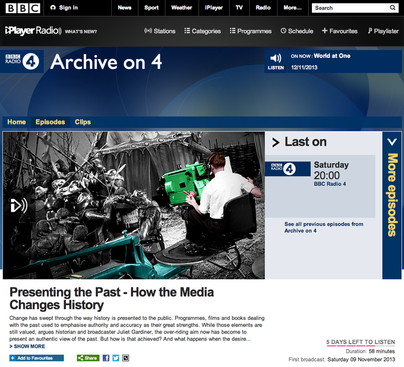
She said that as a historical advisor on Atonement (2007), there was a decision that had made her uneasy- the depiction of a black soldier appearing with Robbie in Dunkirk. She asserts: "In fact, it was almost impossible for there to have been a black soldier in the British Expeditionary Force in France". She suspects this was done "to reflect today's multicultural society" and "gave a misleading impression of how Britain was at the time". Screenplay by Christopher Hamilton- explains it away as colour-blind casting, but says "it probably wasn't accurate". This element of the film did prompt discussion at the time, in the Guardian and the Spectator. And Gardiner herself responded to questions, commenting "statistically one would expect there to have been a handful of black soldiers scooped up by the Military Services Act, and one or two of those may have been sent to France with the BEF"- a statement which seems quite contradictory to what she says on her Radio 4 programme. I'm no expert on the 20th century, but I've seen plenty of pictures of black soldiers in both world wars- not just African Americans, or even Imperial troops, but British-born men too, as you can see from this online exhibition from the Ministry of Defence, this slideshow from Phil Gregory of the Black Presence website, and Tony Warner's recent talks at the Imperial War Museum. Surely, even if there wasn't a huge number of black soldiers in the BEF at the beginning of the war, showing one in Atonement makes the larger point that there were black soldiers in World War 2, in the same way as the Lancastria was co-opted to represent many smaller ships that sunk at Dunkirk.
But where I really had to press pause in shock was when Tim Bevan, producer of Elizabeth (1998) as well as Atonement, commented "had that [casting a black actor] taken place in our Elizabeth movie, you wouldn't have been able to prove that, at all, and it would have been interpretative". This is a film which has no problem placing it's own dramatic interpretation on various other historical events- showing the queen sleeping with Robert Dudley, for example- something that really is unprovable. (See Alex von Tunzelman's unpicking of the film on her Guardian Reel History blog). But I'd like to pick up Bevan's gauntlet now, just in case he's planning a third Elizabeth film to follow Elizabeth: The Golden Age (2007). If he ever wants to cast a black actor in a Tudor film (or indeed a Stuart or a Georgian one): I can prove it for him! In my research into Africans in Britain, 1500-1640 for my Oxford D.Phil. thesis I found evidence of over 360 Africans living in England and Scotland during the period. (Oh, please, someone make a film set in the court of James IV of Scotland, featuring the "More Tabronar"). More specifically, there is clear evidence that Elizabeth I had at least one African servant at her court. Records survive from 1574 and 1575 showing her ordering clothes for a "lytle Blackamoore" from her tailor. Further to this, a painting known as "Elizabeth I at Kenilworth" shows her being entertained by a small troupe of black musicians. This was in keeping with a wider trend of Africans working at royal and aristocratic courts across Europe. However, it would equally be accurate to show Africans walking about in Tudor crowd scenes. The most interesting recent attempt to show this was in Dr. Who, The Shakespeare Code (2007). But that's another story (and another blog?).
For now, I just want to end by saying that as historians, we have to work harder to ensure that the Media doesn't Change History, but History Changes the Media. This is a two-way street, but we need to do our bit (by blogging, for example!) to ensure new research is fed into the media. The BBC Radio 3/ AHRC collaboration New Generation Thinkers initiative is a great example of how this can work in practice. Let's have more of that!
You can read yesterday's Twitter discussion on this with @jessicammoody, @cath_fletcher, @michael1952 and @HistoryNeedsYou on Storify.
 RSS Feed
RSS Feed
